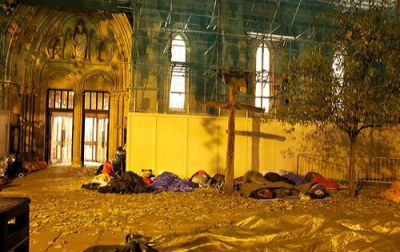
 Good Egg: Wendy Thompson on Fundraising for the Homeless with the Robes Project
Good Egg: Wendy Thompson on Fundraising for the Homeless with the Robes Project
Other | Monday 8th December 2014 | Osh
Wendy Thompson is a nursery school teacher and mother of two from Lambeth, South London. Despite being a busy working mother, Wendy still makes time to volunteer helping homeless and vulnerable people. The day I met with her, she was about to carry out a fundraising sleepout event which had taken months of organization for a small charity called The Robes Project. Last year’s event rose over £80,000 for projects supporting vulnerable people in South London. This is her story.
"I'm currently working with a winter shelter called The Robes Project, which basically operates from Southwark, near Bermondsey, all the way down to Lambeth. About 90% of the guests are sleeping rough on the streets, and the project is a way for charities to open up their churches and church halls to provide hospitality to people that would be sleeping rough. Besides that we have an advice worker and a coordinator who help signpost the guests to additional services.
Imagine around 100 - hopefully closer to 200 - people leaving their warm comfy beds for one night, getting friends and family to sponsor them to sleep one night out under the stars, to stand alongside our guests who sleep rough, or are in vulnerable housing situations. On occasion the language isn’t very good and you might have an unscrupulous landlord who will get [guests] to sign things they shouldn’t be signing, before they know it their tenancies are terminated. The monies raised from the sleepout helps to keep the [Robes] project going for another year, it’s really, really vital.

Over the last few years we’ve found that there’s a real synergy, the idea that you give up your bed for one night, people really get behind it. It’s our major source of funding. Last year we had 110 people sleep out and we raised over £82,000. And last year the whole project cost £85,000 to run for a year, so it just goes to show how much the project relies on the sleepout!
Robes is a very small project, it’s very intimate, and at the heart of it is trying to see each guest as an individual. We communicate, we try to empower them, helping them to make the most of their skills. Often we see just how creative, just how resourceful they have to be to get by. With Robes, they know that it is a safe place, their name will be on the list, some guests come for the first night and tell us that it’s the first time in months they’ve been able to just put their head down and go to sleep.
What have I learnt from volunteering? Well, like anybody, I like nice things, but in the seven years that I’ve volunteered with homeless and vulnerable people, I’ve seen that on the mere flick of a coin, anybody could be wearing their shoes. You see someone walking down the street - can you tell if they’re homeless or not? Fundamentally, they’re a human being and you’d hope that people would treat them with respect, regardless of whether they’re housed or not housed.
Certain places that we take for granted are denied to those who are homeless – even somewhere like McDonalds has bouncers – they will tell guests “you’re not allowed in here.” Public toilets even, they’re often paid facilities, only open at certain times of the day. The guests are denied their dignity. Access to clean drinking water, in one of the top eight [wealthiest] countries in the world, [we assume] is a right not a privilege. But if you’re homeless, you aren’t allowed to go into lots of places and ask for a drink of water. Toilets, sanitation, all these things we take for granted as a right, if you’re not housed, you’re denied access to them.
A few years ago, we had a guest who was unwell, and I rang round the local doctors’ surgeries to try and get them looked at. The minute they found out the person was homeless, they just didn’t want to know about it, even though it’s meant to be part of their primary care remit. I found that to be a real stark eye-opener. And because of the [poor] quality of life, when you’re homeless, life expectancy is vastly reduced. You’re on high alert all the time, your brain is producing all this cortisone, all this adrenaline, your diet is very poor and you’re devoid of nutrients which makes you much more susceptible to life-threatening illnesses, just because of the [lack] of those things that we take for granted.
It’s very humbling to see that with the right assistance, with [Robes] standing alongside in solidarity, the light comes back to the guest’s eyes, they start taking pleasure in things and really living again, going towards thriving. And it makes me think that we really do have so much. No one’s saying that you can’t have nice things, but life is so much more about experiences and relationships."
As told to Anna Norbury
Donate to the Robes Project here
